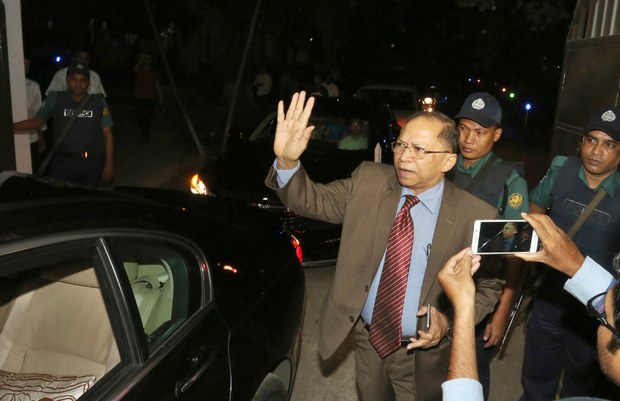Bangladesh Chief Justice's Resignation Angers Opposition, Bar Association
2017.11.13
Dhaka
 Bangladesh Chief Justice Surendra Kumar Sinha talks with reporters in front of his home before leaving for Australia, Oct. 13, 2017.
Bangladesh Chief Justice Surendra Kumar Sinha talks with reporters in front of his home before leaving for Australia, Oct. 13, 2017.
The Bangladesh government forced embattled Chief Justice S.K. Sinha to resign while he was abroad, according to the country’s top opposition politician and the Supreme Court Bar Association, whose president described the move as unprecedented.
But officials from the Awami League-led government said Sinha had tendered his resignation in Singapore last week, and that he faced corruption and money laundering charges back home.
“The government has sent Chief Justice Sinha abroad forcefully,” Khaleda Zia, chairwoman of the opposition Bangladesh National Party, told a public meeting on Sunday. “Not only did they send him overseas, they sent agency people abroad and forced him to resign. He tried to return home.”
Advocate Zainul Abedin, president of the Bangladesh Supreme Court Bar Association, described the resignation and incidents leading up to it as a black mark on the rule of law in the country.
“Such a vacuum of the post of the chief justice has never happened before,” he told a press conference on Saturday.
Not so, said Attorney Gen. Mahbubey Alam.
“He resigned because his colleagues refused to work with him. The government had nothing to do with it,” Alam told BenarNews.
On Monday, Sinha, who was due to retire as chief justice in January 2018 after the court’s current session, could not be reached for comment or to confirm he had resigned.
Last month, he traveled to Australia amid reports that he was pressured to go for having presided over a unanimous ruling that angered the government of Prime Minister Sheikh Hasina by voiding a constitutional amendment, which gave parliament the authority to impeach judges.
‘Government had no role in his resignation’
Sinha had taken a one-month leave that was approved by President Abdul Hamid that was to end on Nov. 10, according to Joynal Abedin, Hamid’s press secretary.
“The chief justice could have returned,” Abedin told BenarNews. “Instead he resigned from Singapore.”
Abedin said Sinha was traveling from Australia to Canada, where one of his daughters lives. During a stop in Singapore, he handed over his resignation letter to Bangladesh’s high commissioner there, who sent a hard copy to Bangladesh the next day.
Law Minister Anisul Haque, who previously warned that the country’s Anti-Corruption Commission would investigate the allegations against Sinha, said the chief justice had acted on his own volition.
“The government had no role in his resignation. He sent his resignation from Singapore. Were there any government agents who forced him to resign?” Haque told BenarNews.
Sinha’s letter has not been made public and he has not commented about it.
16th amendment ruling
The Awami League party and Sinha had been at loggerheads after the Supreme Court repealed the 16th amendment to the constitution, which was passed in 2014 and empowered parliament to impeach Supreme Court judges if allegations of misconduct were proven.
The tensions peaked in July following the publication of the full 799-page judgment, which was mainly written by Sinha. Hasina and other ruling party leaders had accused Sinha of undermining her father Sheikh Mujibur Rahman, the founder of Bangladesh, and of defaming parliament.
Sinha denied the allegations. He warned Alam that the government was overreacting to the verdict while the judiciary showed restraint.
On Oct. 4, Haque told reporters that Sinha had taken sick leave because he was suffering from cancer and would travel abroad for treatment.
Before departing Dhaka nine days later, Sinha denied that he was sick, saying he was leaving the country for the sake of judiciary.
On Oct. 14, the Supreme Court issued a rare statement about Sinha’s departure. The statement said Hamid had invited all judges of the Supreme Court’s Appellate Division to his office on Sept. 30 and handed them a set of allegations including corruption, money laundering and moral erosion against Sinha.
The next day, the judges went to Sinha’s residence and told him they would not carry out their duties unless he could clarify the corruption charges. Instead of clarifying the charges, Sinha took leave, the statement said.
‘Bad precedent’
Professor Nizam Uddin Ahmed, a political commentator who authored several books on politics and government, said Sinha’s resignation following the corruption charge set a “bad precedent.”
“He had some problems with the executive branch over the 16th constitution amendment verdict,” he told BenarNews. “But the consequences of the Chief Justice exiting would harm our quest for rule of law and good governance, no matter what factors prompt him to resign.”
“Sinha had been fighting with the bureaucracy to guarantee the independence of judiciary. His departure will help the bureaucracy establish a firm grip on the judiciary. This is a dark chapter in our political and judicial history,” Ahmed added.







